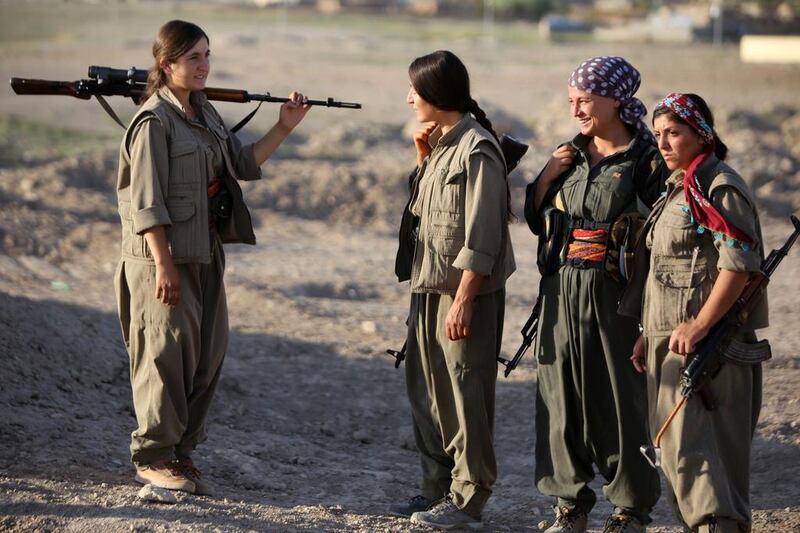ERBIL // Iraqi Kurds were once considered the one domestic force that could stop ISIL’s onslaught, but recent battlefield losses to the Sunni militants have called that theory into question.
Now, with the Obama administration assembling an international coalition to rout ISIL from its strongholds in Iraq and Syria, Kurdish officials are feeling left out of the deliberations. The plan has ruffled feathers in Erbil, the capital of autonomous Iraqi Kurdistan, where the regional government is grappling with an ailing economy and anger from Baghdad over its moves towards independence.
“We don’t know what Obama wants from us, but it’s clear the Americans don’t have a plan except to provide more weapons to the people here. But that won’t solve Iraq’s political problems, which is what needs to be addressed,” said an adviser to Nechirvan Barzani, prime minister of the Kurdistan Regional Government.
Details of Mr Obama’s plan for an escalated campaign to defeat ISIL will be thrashed out at a meeting in Paris on Monday, including arming and training Iraqi and Kurdish peshmerga soldiers. In a visit to the Middle East over the past few days, the US secretary of state John Kerry has received commitments of support from Sunni Arab allies, including the training of certain Syrian rebel groups in Saudi Arabia, which has endorsed the plan along with the UAE and the four other GCC members, as well as Egypt, Iraq, Jordan and Lebanon.
The need for bolstering the Kurdish forces was made clear last month when an ISIL offensive captured several Kurdish-held villages and came within striking distance of Erbil. Dashing notions of Kurdish military invincibility, the attack exposed the peshmerga forces as poorly equipped, hobbled by factional divisions and dependent on outside support.
Even Kurdish officials are acknowledging some of the shortcomings thata also led to the disintegration of Iraq’s national army during the initial ISIL onslaught in June, which began with the capture of Mosul, Iraq’s second-largest city, in June.
“We need more weapons and we need training from the Americans,” said Dler Mustafa, the deputy head of the Kurdistan Regional Government parliamentary committee for peshmerga affairs.
“Da’ash [ISIL] uses advanced American weapons against us that it captured from the Iraqi army and so we need more weapons, not just machine guns and bullets to defend ourselves.”
He said about 200 US soldiers and a number of French military personnel had arrived to train peshmerga forces in Kurdistan, but both countries had declined to provide heavy weapons such as anti-tank and anti-aircraft defences.
He attributed their refusal to fear of angering the Iraqi government, which considers such moves as steps towards Kurdish independence.
The Kurds’ near-defeat by ISIL was followed by another setback last month, in the negotiations that led to the formation of a new government in Baghdad.
The replacement of the divisive Shiite-led government of Nouri Al Maliki with a more inclusive one, prodded on by the international community, was seen as a last resort to halt the sectarian infighting that hastened the rise of ISIL and threatened to dismember Iraq.
But the Kurds had little say in that process, which replaced Mr Al Maliki with Haider Al Abadi, a Shiite who has promised to reach out and unite Iraq’s Sunnis and Kurds and end the partisan discord that defined the Al Maliki era.
They agreed to participate in the government primarily because of pressure from the US, said the adviser to the KRG prime minister.
“Everyone knows this new government will fail because the reality is, Iraq cannot be governed under the current system. We need a confederation, not a central government that rules in its current form,” the adviser said.
The apparent strong-arming of the Kurds to acquiesce to the Abadi government is a sign of their declining influence, which has been hastened by a sluggish economy, said Kawa Hassan, an expert on Kurdish politics and a visiting scholar at the Beirut-based Carnegie Middle East Centre.
“Against this backdrop, US and Iranian pressure pushed Kurds to participate in the new government without getting clear-cut guarantees that Baghdad will meet their demands,” he said.
Those demands include receiving billions of dollars from the national budget that Baghdad has refused to disburse over the past eight months. That refusal is driven by disputes that include control over Kurdistan’s vast petrochemical wealth, a move that has plunged the Kurdish region into economic crisis, leaving scores of civil servants without salaries.
Backed by Washington, officials in Baghdad also have sought to stop Kurdish attempts to sell oil independently of the central oil ministry. They also feud over control of territories, such as Kirkuk, which are claimed by Kurds, Arabs and other ethnic-religious communities.
Mr Hassan said the economic turmoil was a result of “massive corruption at the highest levels and mismanagement of economy by KRG”.
Kudsish officials say their participation in the new government will end in three months if thee demads are not met by Baghdad.
Kurdish officials such as Sirwan Zahawy, a former member of the Iraqi parliament, also think the peshmerga could play a vital role in helping the US defeat ISIL. But saving Iraq’s government from failure is another matter.
“We are participating in this government because of international pressure and because we want to resolve the disputes of the budget” and disputes over territory,” he said. “We don’t participate because we want ministerial posts or because we expect the government to succeed. We know it won’t.”
foreign.desk@thenational.ae





